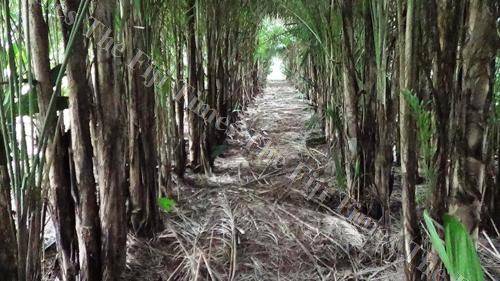Fiji offers some of the best tasting and unique tropical foods of anywhere in the world, but some local farmers are turning once-worthless produce into a harvesting goldmine.
In this new monthly series, Chef Seeto goes in search of local ingredients that are now the pride of Fijian resort menus.
HOGAMATA FARM – FIJI’S HOME OF FRESH ‘HEART OF PALM’ CULTIVATION
Hogamata farm at Lokia, Sigatoka Valley, is Fiji’s only cultivator of Pejibaye or Peach Palm Bactris gasipaes, a suckering palm which enables sustainable harvesting from the same plant.
The farm has over 4000 bearing palms, 100 of which are separately cultivated as an orchard for fruit and seed production.
Poultry manure, high quality compost, the recycling of all harvest debris and an organic fertiliser provide the crop nutrients.
These together with gravity-fed drip-irrigation from our own spring and the non-destructive harvesting technique provide for a sustainable and advanced agro-ecological cultivation system.
HEART OF PALM — PEJIBAYE OR PEACH PALM BACTRIS GASIPAES
The heart of palm is the actual growing area of the palm trunk — where the fronds actually originate from.
For culinary purposes, precisely where the “heart” starts and finishes in the stem is a matter of opinion and individual chef/consumer preference, but the two ends to it are quite different such that there are two different parts to the “heart” — the basal ‘thick end’ and the distal ‘long-thin’ end. Both have their uses.
As one goes lower down the trunk — the basal thick end, the tissue becomes increasingly hard and so more difficult to slice.
Usually one finds the desired start to the heart by the ease with which it can be sliced — it is a matter of preference.
At the thin end, the heart becomes the embryonic leaf and separates into discernible leaf pieces as one cuts it.
Hogamata heart of palm is supplied “ready to eat” … there is no protective sheath and we have cut down at both ends to readily edible place.
It is possible to send palm hearts protected in an outer sheath and with ‘protective’ caps of less edible portions at both the thick end and the thin leaf end. If well wrapped in cling-wrap, the palm hearts can be dispatched by courier or other delivery means without having to be refrigerated.
PEACH PALM — PREPARATION, STORAGE AND OXIDATION
Peach palm is becoming the industry standard for gourmet i.e. fresh heart of palm:
- Because of its multiple trunks, harvesting is non-destructive, as one trunk is cut, suckers are growing up to take its place, the palm is not killed. This is how bananas grow and are cultivated. Other species of palm have to be destructively harvested for their heart.
- Unlike most species of palm, the peach palm heart contains very little calcium oxalate and so hardly oxidizes (browns) at all. Sago palm heart (seko) is sticky and becomes dark brown within a matter of seconds of exposure.
- Good shelf life. If kept cling wrapped ie protected from oxidation and drying out and refrigerated, peach palm heart can keep for three weeks.
SUPPLY
Hogamata Farm is Fiji’s only producer of non-destructively harvested ‘heart of palm’. We are currently supplying selected outlets up to 75 kg a month, and this will increase to 150 kg a month in mid 2015.
We currently harvest once a week on Mondays, and we need orders by CoB the previous Friday. The minimum order is 3 kg. Orders of 10 kg or more can be supplied at any time with a three day supply time.
Price
Hogamata heart of palm sold ready for consumption (i.e. without protective sheaths or end caps) is sold at $28.50/kg. Orders of 10 kg or over are delivered free on Viti Levu. Freight for orders under 10 kg is paid by the purchaser.
Contact: Dick Watling – [email protected] Mobile: 9923189
HOGAMATA PALMS
Four year old palms at Hogamata Farm – already harvested once A 24
* Lance Seeto is the executive chef, author and food writer based on Castaway Island, and culinary ambassador for Fiji Airways and Tourism Fiji.
* Watch Taste of Paradise for new episodes every Sunday 7.30pm, and repeats of previous episodes at 4pm, only on Fiji One.
First published in Fiji Times:
- One man’s trash is another’s treasure – Chef Lance Seeto
- Sunday, March 08, 2015

